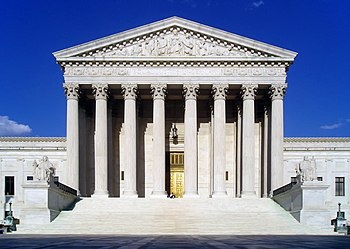 |
| (Photo credit: Wikipedia) |
The U. S . Supreme Court has only decided ten special education cases. They have not taken one for a long time. Fortunately, special education is not a liberal vs conservative issue. It generally receives strong bipartisan support. (That does not mean that Congress will soon reauthorize IDEA however.)
There is currently one special ed case that the Court is considering. It involves the stay put provision:
IDEA § 615 (j) provides that (except in certain discipline cases), during the pendency of any due process or court proceedings pursuant to this section, unless the parties agree otherwise, the student ‘…shall remain in the then-current educational placement of the child…” This is commonly referred to as the stay put provision. The stay put placement is the last agreed upon IEP, unless the parties agree otherwise. See 34 C.F.R. § 300.518.
The Supreme Court interpreted and endorsed the stay put decision in the case of Honig v. Doe 484 U.S. 305, 108 S.Ct. 594, 559 IDELR 231 (1988). In that decision, the Supreme Court, noting the Congressional intent in preventing the exclusion of disabled students and reiterating the importance of the procedural safeguards under the IDEA, refused to read a dangerousness exception into the stay put provision. Honig v. Doe, supra. (NOTE; please note that IDEA’04 has added other provisions pertaining to danger/injury.)
Two circuits, DC and the Sixth, have held that once a District Court rules that FAPE is provided, the stay put protection, even if the child is in private school, ends. So if the student is in private school, the school district no longer has to pay at that point. Two circuits disagree, the Third and Ninth, holding that stay put applies until the case is concluded, so in our example the public school district would be on the hook for tuition at the private school until the end of the case. The case that the supremes are contemplating accepting is Ridley Sch Dist v MR by Parents, Docket No. 13-1547.
On October 6th, the Court invited the Solicitor General to file a brief in the case.
If the Court accepts the case it will be a big deal; we don't have much Supreme Court guidance. What we do have falls into some odd categories like burden of persuasion, expert witness fees, pro se parties and related services (that's 50% of the cases!). Not the pressing questions of the day although obviously still important.
Here is the SCOTUS blog page for this case. Here is a post on Disability Scoop concerning the request for briefing by the Solicitor General. Here is the Supreme Court's docket page for this case.
We'll keep you posted.












No comments:
Post a Comment